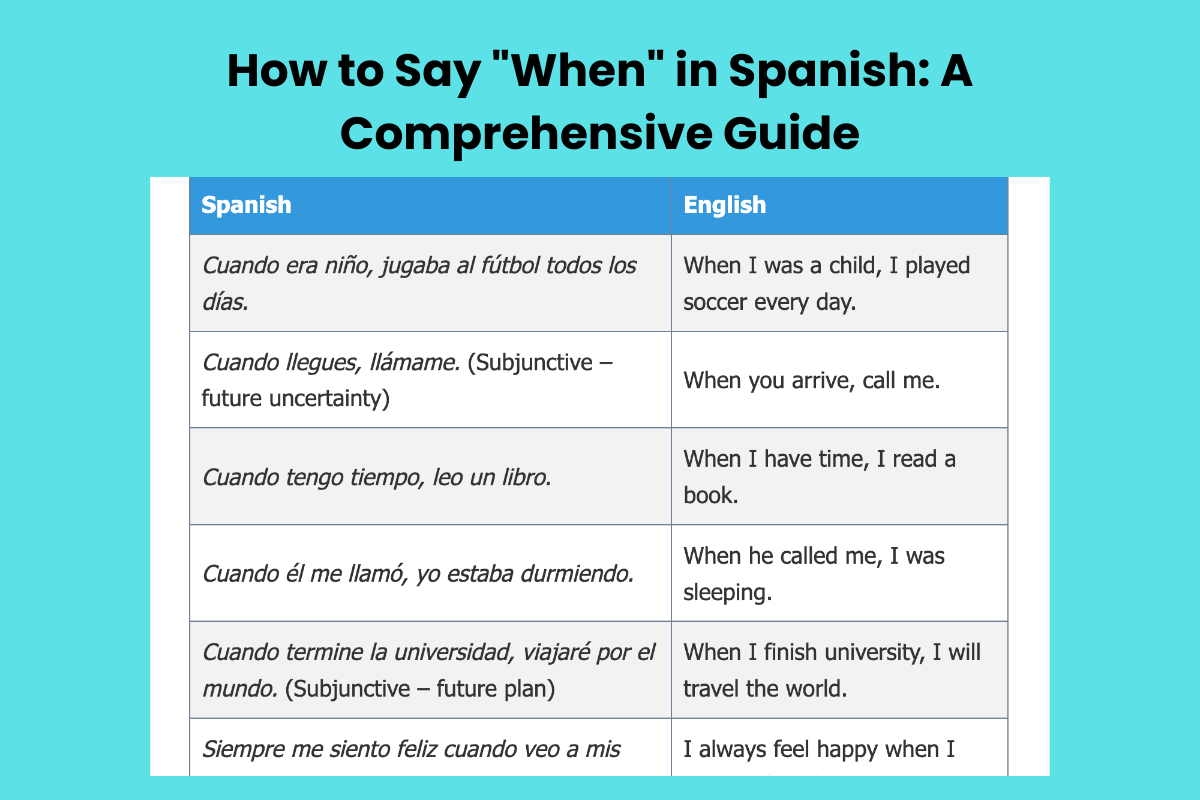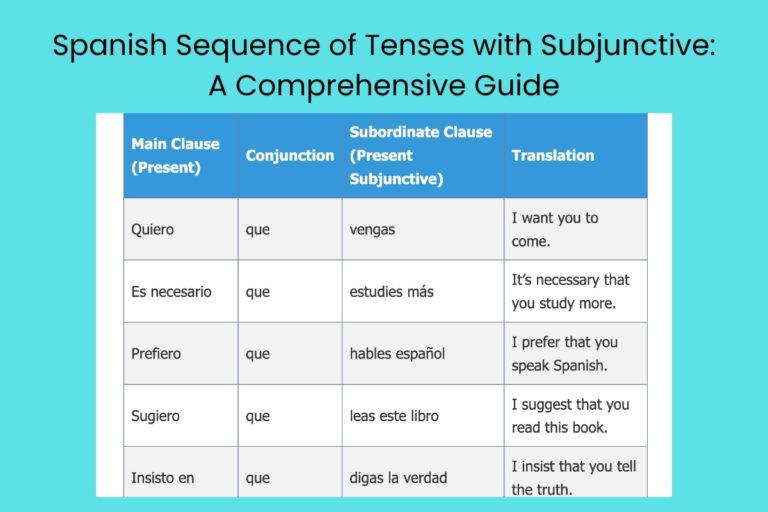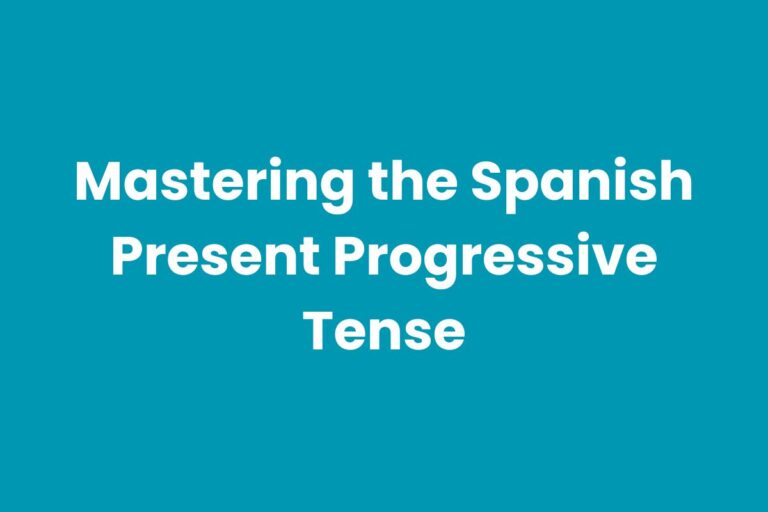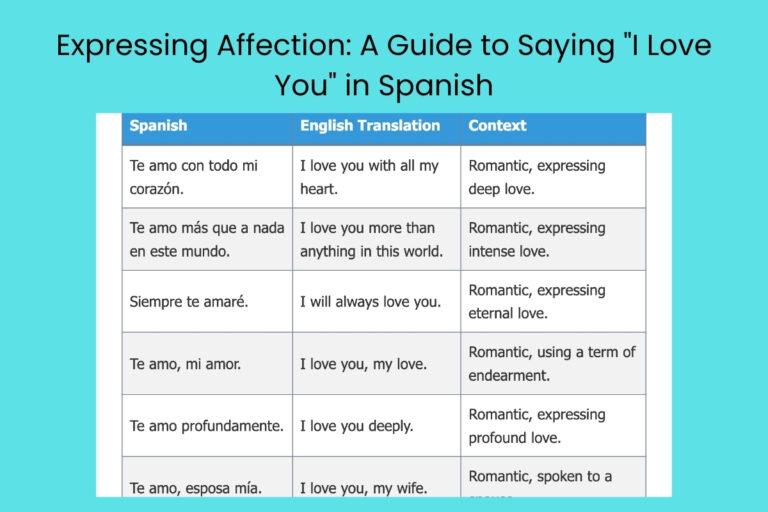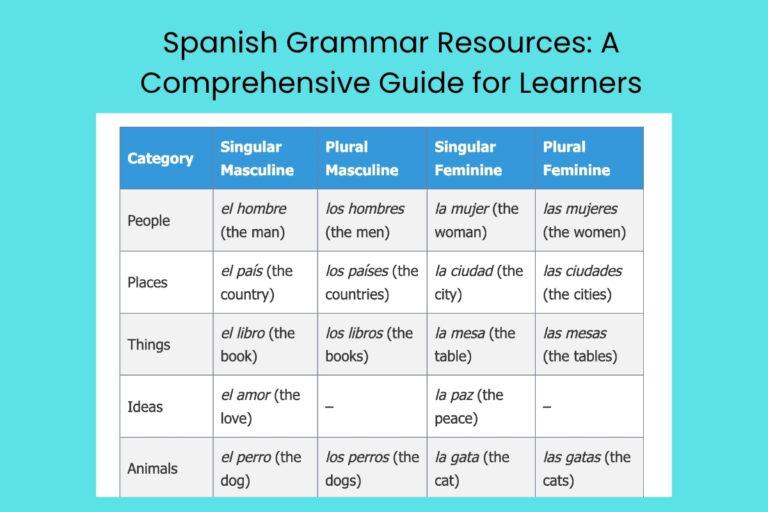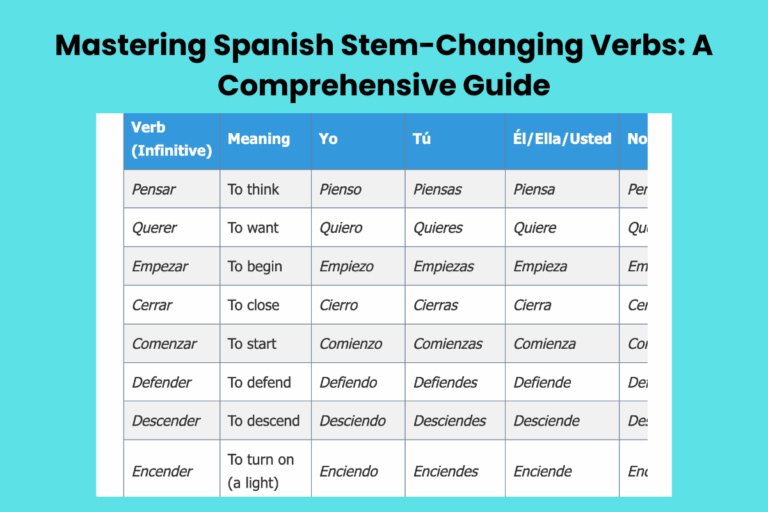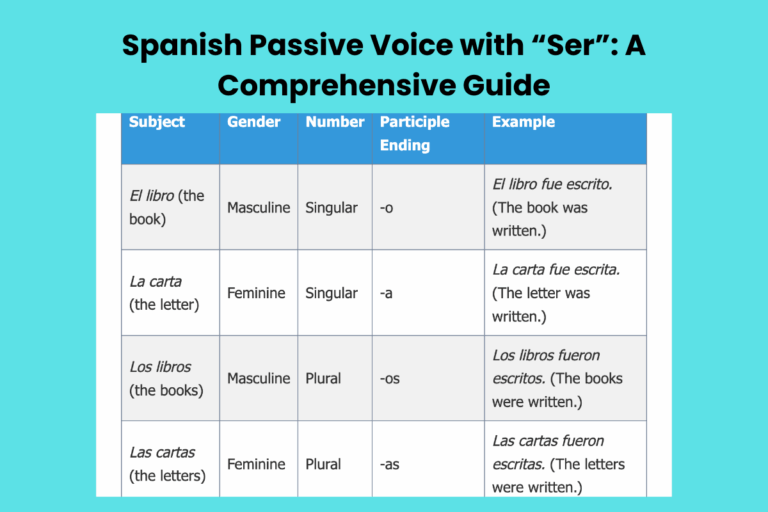How to Say “When” in Spanish: A Comprehensive Guide
Understanding how to express “when” in Spanish is crucial for constructing complex sentences and expressing temporal relationships. This skill allows you to specify the timing of events, ask questions about when things happen, and create a more nuanced narrative.
This article provides a comprehensive guide to the various ways to say “when” in Spanish, covering different grammatical structures, contexts, and usage rules. Whether you’re a beginner or an advanced learner, this guide will equip you with the knowledge and practice you need to master this essential aspect of Spanish grammar.
This article is designed for students of all levels, from beginners learning the basics to advanced learners seeking to refine their understanding and usage. By the end of this guide, you’ll be able to confidently and accurately express “when” in a variety of situations, enhancing your overall fluency and communication skills in Spanish.
Table of Contents
- Introduction
- Definition of “When” in Spanish
- Structural Breakdown
- Types and Categories of “When” in Spanish
- Examples
- Usage Rules
- Common Mistakes
- Practice Exercises
- Advanced Topics
- FAQ
- Conclusion
Definition of “When” in Spanish
The concept of “when” in Spanish is expressed through various words and phrases that indicate time or a specific moment an event occurs. These temporal markers can function as conjunctions, adverbs, or prepositions, each with its own nuances and grammatical requirements.
Mastering these terms is essential for effective communication in Spanish, allowing you to accurately convey the timing and sequence of events.
The most common translation of “when” is cuando, but Spanish offers a variety of alternatives depending on the specific context. These alternatives include al + infinitive, en cuanto, tan pronto como, mientras, siempre que, después de que, antes de que, and hasta que. Each of these phrases introduces a temporal clause, which specifies the time frame in which the main clause takes place.
Understanding the subtle differences between these expressions and their grammatical implications (e.g., whether to use the subjunctive or indicative mood) is crucial for accurate and natural-sounding Spanish.
Structural Breakdown
The structure of sentences using “when” in Spanish typically involves a main clause and a temporal clause introduced by one of the aforementioned temporal markers. The order of these clauses can vary, but the choice often affects punctuation and emphasis.
Let’s examine the basic structures:
- Temporal Marker + Clause, Main Clause: This structure places emphasis on the timing of the event. A comma usually separates the temporal clause from the main clause. For example: Cuando termine mi trabajo, iré al cine. (When I finish my work, I will go to the cinema.)
- Main Clause + Temporal Marker + Clause: This structure is more common and often sounds more natural. No comma is needed unless the temporal clause is particularly long or complex. For example: Iré al cine cuando termine mi trabajo. (I will go to the cinema when I finish my work.)
The verb tense used in both the main clause and the temporal clause depends on the specific temporal marker and the intended meaning. Some temporal markers require the subjunctive mood, while others require the indicative mood.
Understanding these rules is essential for grammatical accuracy.
The proper structure also includes the correct use of prepositions and conjunctions to ensure the temporal relationship is clear. For instance, después de que (after) and antes de que (before) require the use of the subjunctive in certain contexts, adding another layer of complexity to the structure.
Types and Categories of “When” in Spanish
Spanish offers a rich variety of expressions to convey the concept of “when,” each with its own specific nuance and grammatical rules. Here’s a breakdown of the most common ones:
Cuando (When)
Cuando is the most direct translation of “when” and is used to indicate a time or circumstance in which something happens. It can introduce a clause referring to the past, present, or future. The choice between the indicative and subjunctive mood depends on whether the action in the *cuando* clause is viewed as a completed fact or a hypothetical event.
Al + Infinitive (Upon/When)
Al followed by an infinitive is used to express “upon” or “when” something happens. It indicates an action that occurs immediately after another. This construction is concise and often used to describe habitual actions or immediate consequences.
En cuanto (As soon as)
En cuanto means “as soon as” and indicates that one event will happen immediately after another. It emphasizes the immediacy of the sequence. Like *cuando*, it can trigger the subjunctive if the action is in the future and uncertain.
Tan pronto como (As soon as)
Tan pronto como is another way to say “as soon as,” similar to en cuanto. It also emphasizes the immediate succession of events. The same rules regarding the subjunctive mood apply as with *cuando* and *en cuanto*.
Mientras (While/As)
Mientras means “while” or “as” and indicates that two actions are happening simultaneously. It’s used to describe concurrent events. *Mientras* does not usually trigger the subjunctive; the indicative mood is typically used.
Siempre que (Whenever/As long as)
Siempre que means “whenever” or “as long as.” It indicates a condition or a repeated occurrence. *Siempre que* often requires the subjunctive mood when expressing a condition or a hypothetical situation.
Después de que (After)
Después de que means “after” and indicates that one event happens after another. The subjunctive mood is used if the action in the *después de que* clause is in the future relative to the main clause.
Antes de que (Before)
Antes de que means “before” and indicates that one event happens before another. Because it expresses anticipation or a potential event, it almost always requires the subjunctive mood.
Hasta que (Until)
Hasta que means “until” and indicates that an action continues up to a certain point in time. Like *antes de que* and *después de que*, it can trigger the subjunctive mood depending on the context and the timing of the events.
Examples
To illustrate the usage of these different expressions, let’s look at some specific examples. These examples are divided by category to help you understand the nuances of each expression.
Cuando Examples
The following table provides examples of how to use cuando in various contexts, demonstrating the use of both the indicative and subjunctive moods.
| Spanish | English |
|---|---|
| Cuando era niño, jugaba al fútbol todos los días. | When I was a child, I played soccer every day. |
| Cuando llegues, llámame. (Subjunctive – future uncertainty) | When you arrive, call me. |
| Cuando tengo tiempo, leo un libro. | When I have time, I read a book. |
| Cuando él me llamó, yo estaba durmiendo. | When he called me, I was sleeping. |
| Cuando termine la universidad, viajaré por el mundo. (Subjunctive – future plan) | When I finish university, I will travel the world. |
| Siempre me siento feliz cuando veo a mis amigos. | I always feel happy when I see my friends. |
| Cuando hacía frío, nos quedábamos en casa. | When it was cold, we stayed at home. |
| Cuando tengas la oportunidad, visítame. (Subjunctive – future possibility) | When you have the opportunity, visit me. |
| Cuando el sol se pone, el cielo se vuelve naranja. | When the sun sets, the sky turns orange. |
| Cuando yo cocino, siempre hago mucha comida. | When I cook, I always make a lot of food. |
| Cuando necesites ayuda, puedes contar conmigo. (Subjunctive – hypothetical situation) | When you need help, you can count on me. |
| Cuando llovía, llevábamos paraguas. | When it rained, we carried umbrellas. |
| Cuando me gradúe, buscaré un trabajo. (Subjunctive – future event) | When I graduate, I will look for a job. |
| Cuando escucho música, me relajo. | When I listen to music, I relax. |
| Cuando llegamos al hotel, estábamos muy cansados. | When we arrived at the hotel, we were very tired. |
| Cuando vengas, traeré pastel. (Subjunctive – anticipating a visit) | When you come, I will bring cake. |
| Cuando tengo dinero, compro libros. | When I have money, I buy books. |
| Cuando visité España, me encantó la cultura. | When I visited Spain, I loved the culture. |
| Cuando me sienta mejor, saldré a caminar. (Subjunctive – future feeling) | When I feel better, I will go for a walk. |
| Cuando él habla español, suena muy fluido. | When he speaks Spanish, he sounds very fluent. |
| Cuando sea mayor, quiero tener una casa en la playa. (Subjunctive – future aspiration) | When I am older, I want to have a house on the beach. |
| Cuando estudiaba, siempre tomaba café. | When I studied, I always drank coffee. |
| Cuando me case, haré una gran fiesta. (Subjunctive – future plan) | When I get married, I will have a big party. |
| Cuando veo una película buena, la recomiendo. | When I see a good movie, I recommend it. |
| Cuando el profesor explica, todos prestan atención. | When the teacher explains, everyone pays attention. |
| Cuando vaya a Madrid, visitaré el museo del Prado. (Subjunctive – future trip) | When I go to Madrid, I will visit the Prado Museum. |
Al + Infinitive Examples
This table illustrates the use of al + infinitive to express “upon” or “when” something happens immediately after another action.
| Spanish | English |
|---|---|
| Al llegar a casa, me quité los zapatos. | Upon arriving home, I took off my shoes. |
| Al salir el sol, los pájaros empezaron a cantar. | Upon the sun rising, the birds started to sing. |
| Al probar la comida, supe que estaba deliciosa. | Upon tasting the food, I knew it was delicious. |
| Al verla, me enamoré. | Upon seeing her, I fell in love. |
| Al terminar la reunión, todos se fueron. | Upon finishing the meeting, everyone left. |
| Al abrir la puerta, me sorprendí. | Upon opening the door, I was surprised. |
| Al escuchar la noticia, me puse triste. | Upon hearing the news, I became sad. |
| Al despertarme, sentí mucho frío. | Upon waking up, I felt very cold. |
| Al empezar la película, apagamos las luces. | Upon starting the movie, we turned off the lights. |
| Al leer el libro, aprendí mucho. | Upon reading the book, I learned a lot. |
| Al tocar el piano, me siento relajado. | Upon playing the piano, I feel relaxed. |
| Al entrar en la tienda, vi un vestido hermoso. | Upon entering the store, I saw a beautiful dress. |
| Al recibir el regalo, me emocioné. | Upon receiving the gift, I was excited. |
| Al caminar por el parque, encontré una moneda. | Upon walking through the park, I found a coin. |
| Al cruzar la calle, miré a ambos lados. | Upon crossing the street, I looked both ways. |
| Al cocinar, siempre escucho música. | When cooking, I always listen to music. |
| Al viajar, me gusta probar comidas nuevas. | When traveling, I like to try new foods. |
| Al estudiar, necesito un ambiente tranquilo. | When studying, I need a quiet environment. |
| Al hacer ejercicio, me siento con más energía. | When exercising, I feel more energetic. |
| Al hablar con ella, me siento feliz. | When talking to her, I feel happy. |
En cuanto Examples
The following table provides examples of how to use en cuanto to express “as soon as.” Note the use of the subjunctive when the action is in the future and uncertain.
| Spanish | English |
|---|---|
| En cuanto llegue, te llamaré. (Subjunctive – future action) | As soon as I arrive, I will call you. |
| En cuanto terminó la película, nos fuimos. | As soon as the movie ended, we left. |
| En cuanto tenga tiempo, te ayudaré. (Subjunctive – future action) | As soon as I have time, I will help you. |
| En cuanto lo vi, lo reconocí. | As soon as I saw him, I recognized him. |
| En cuanto sepa la respuesta, te la diré. (Subjunctive – future action) | As soon as I know the answer, I will tell it to you. |
| En cuanto abrí la puerta, sentí el calor. | As soon as I opened the door, I felt the heat. |
| En cuanto termine de trabajar, iré al gimnasio. (Subjunctive – future action) | As soon as I finish working, I will go to the gym. |
| En cuanto me levanto, tomo café. | As soon as I get up, I drink coffee. |
| En cuanto empiece a llover, entraremos. (Subjunctive – future action) | As soon as it starts to rain, we will go inside. |
| En cuanto llegamos a la playa, nos metimos al agua. | As soon as we arrived at the beach, we went into the water. |
| En cuanto pueda, te visitaré. (Subjunctive – future action) | As soon as I can, I will visit you. |
| En cuanto sonó la alarma, me desperté. | As soon as the alarm rang, I woke up. |
| En cuanto me gradúe, buscaré un trabajo. (Subjunctive – future action) | As soon as I graduate, I will look for a job. |
| En cuanto la probé, me encantó la comida. | As soon as I tasted it, I loved the food. |
| En cuanto se ponga el sol, hará frío. (Subjunctive – future action) | As soon as the sun sets, it will be cold. |
| En cuanto lo vea, le daré tu mensaje. (Subjunctive – future action) | As soon as I see him, I will give him your message. |
| En cuanto termine de leer este libro, te lo prestaré. (Subjunctive – future action) | As soon as I finish reading this book, I will lend it to you. |
| En cuanto el avión aterrice, te avisaré. (Subjunctive – future action) | As soon as the plane lands, I will let you know. |
| En cuanto la vea, le preguntaré. (Subjunctive – future action) | As soon as I see her, I will ask her. |
| En cuanto tenga noticias, te informaré. (Subjunctive – future action) | As soon as I have news, I will inform you. |
Tan pronto como Examples
The following table shows the use of tan pronto como, which is very similar to en cuanto. The same subjunctive rules apply.
| Spanish | English |
|---|---|
| Tan pronto como llegue, te llamaré. (Subjunctive – future action) | As soon as I arrive, I will call you. |
| Tan pronto como terminemos, saldremos. (Subjunctive – future action) | As soon as we finish, we will leave. |
| Tan pronto como lo vea, se lo diré. (Subjunctive – future action) | As soon as I see him, I will tell him. |
| Tan pronto como tenga noticias, te avisaré. (Subjunctive – future action) | As soon as I have news, I will let you know. |
| Tan pronto como sepa la respuesta, te la contaré. (Subjunctive – future action) | As soon as I know the answer, I will tell you. |
| Tan pronto como pueda, te ayudaré. (Subjunctive – future action) | As soon as I can, I will help you. |
| Tan pronto como la vea, le preguntaré. (Subjunctive – future action) | As soon as I see her, I will ask her. |
| Tan pronto como llegues, avísame. (Subjunctive – future action) | As soon as you arrive, let me know. |
| Tan pronto como termine de trabajar, iré a casa. (Subjunctive – future action) | As soon as I finish working, I will go home. |
| Tan pronto como me levante, desayunaré. (Subjunctive – future action) | As soon as I get up, I will have breakfast. |
| Tan pronto como lo encuentre, te lo daré. (Subjunctive – future action) | As soon as I find it, I will give it to you. |
| Tan pronto como lo escuche, te lo repetiré. (Subjunctive – future action) | As soon as I hear it, I will repeat it to you. |
| Tan pronto como la entiendas, te gustará. (Subjunctive – future action) | As soon as you understand her, you will like her. |
| Tan pronto como me acueste, me dormiré. (Subjunctive – future action) | As soon as I lie down, I will fall asleep. |
| Tan pronto como lo resuelva, te lo explicaré. (Subjunctive – future action) | As soon as I solve it, I will explain it to you. |
| Tan pronto como la reciba, te la enviaré. (Subjunctive – future action) | As soon as I receive it, I will send it to you. |
| Tan pronto como lo sepas, dímelo. (Subjunctive – future action) | As soon as you know it, tell me. |
| Tan pronto como la veas, salúdala. (Subjunctive – future action) | As soon as you see her, greet her. |
| Tan pronto como termine el curso, me iré de vacaciones. (Subjunctive – future action) | As soon as the course finishes, I will go on vacation. |
| Tan pronto como me dé tiempo, te llamaré. (Subjunctive – future action) | As soon as I have time, I will call you. |
Mientras Examples
This table illustrates the use of mientras to express “while” or “as,” indicating simultaneous actions. Note that the indicative mood is almost always used with *mientras*.
| Spanish | English |
|---|---|
| Mientras estudio, escucho música. | While I study, I listen to music. |
| Mientras cocinaba, él ponía la mesa. | While I was cooking, he was setting the table. |
| Mientras tú trabajas, yo descanso. | While you work, I rest. |
| Mientras hablábamos, llovía afuera. | While we were talking, it was raining outside. |
| Mientras ella cantaba, él tocaba la guitarra. | While she was singing, he was playing the guitar. |
| Mientras espero, leo un libro. | While I wait, I read a book. |
| Mientras viajábamos, vimos paisajes hermosos. | While we were traveling, we saw beautiful landscapes. |
| Mientras él conducía, yo miraba el mapa. | While he was driving, I was looking at the map. |
| Mientras comemos, vemos las noticias. | While we eat, we watch the news. |
| Mientras caminábamos, charlábamos. | While we were walking, we chatted. |
| Mientras limpiaba, encontré una foto vieja. | While I was cleaning, I found an old photo. |
| Mientras él escribía, yo pensaba. | While he was writing, I was thinking. |
| Mientras aprendo español, visito España. | While I learn Spanish, I visit Spain. |
| Mientras corría, escuchaba música. | While I was running, I listened to music. |
| Mientras ella dormía, yo trabajaba. | While she was sleeping, I was working. |
| Mientras esperamos el autobús, hablamos. | While we wait for the bus, we talk. |
| Mientras él jugaba, yo leía. | While he was playing, I was reading. |
| Mientras ella estudiaba, yo cocinaba. | While she was studying, I was cooking. |
| Mientras ellos caminaban, nosotros corríamos. | While they were walking, we were running. |
| Mientras yo trabajo, tú descansas. | While I work, you rest. |
Siempre que Examples
The following table illustrates the use of siempre que to express “whenever” or “as long as.” Pay attention to the subjunctive mood when a condition or hypothetical situation is implied.
| Spanish | English |
|---|---|
| Siempre que tengas tiempo, visítame. (Subjunctive – conditional) | Whenever you have time, visit me. |
| Siempre que voy al cine, compro palomitas. | Whenever I go to the cinema, I buy popcorn. |
| Siempre que me necesites, llámame. (Subjunctive – conditional) | Whenever you need me, call me. |
| Siempre que estudio, me concentro. | Whenever I study, I concentrate. |
| Siempre que me siento triste, escucho música. | Whenever I feel sad, I listen to music. |
| Siempre que haga buen tiempo, iremos a la playa. (Subjunctive – conditional) | Whenever the weather is good, we will go to the beach. |
| Siempre que puedo, ayudo a los demás. | Whenever I can, I help others. |
| Siempre que viajo, aprendo algo nuevo. | Whenever I travel, I learn something new. |
| Siempre que tenga dinero, viajaré. (Subjunctive – conditional) | Whenever I have money, I will travel. |
| Siempre que como aquí, pido este plato. | Whenever I eat here, I order this dish. |
| Siempre que vengas a mi casa, te prepararé algo rico. (Subjunctive – conditional) | Whenever you come to my house, I will prepare something delicious for you. |
| Siempre que me hables con respeto, te escucharé. (Subjunctive – conditional) | As long as you speak to me with respect, I will listen to you. |
| Siempre que me invites, iré a tu fiesta. (Subjunctive – conditional) | As long as you invite me, I will go to your party. |
| Siempre que estudies, aprobarás el examen. (Subjunctive – conditional) | As long as you study, you will pass the exam. |
| Siempre que trabajes duro, tendrás éxito. (Subjunctive – conditional) | As long as you work hard, you will be successful. |
| Siempre que tengas dudas, pregúntame. (Subjunctive – conditional) | Whenever you have doubts, ask me. |
| Siempre que necesites algo, pídemelo. (Subjunctive – conditional) | Whenever you need something, ask me for it. |
| Siempre que me cuentes la verdad, te creeré. (Subjunctive – conditional) | As long as you tell me the truth, I will believe you. |
| Siempre que me visites, te prepararé té. (Subjunctive – conditional) | Whenever you visit me, I will make you tea. |
| Siempre que estés aquí, me sentiré feliz. (Subjunctive – conditional) | As long as you are here, I will feel happy. |
Después de que Examples
The following table illustrates the use of después de que to express “after.” The subjunctive is used when the action in the *después de que* clause is in the future relative to the main clause.
| Spanish | English |
|---|---|
| Después de que coma, lavaré los platos. (Subjunctive – future action) | After I eat, I will wash the dishes. |
| Después de que terminamos el trabajo, celebramos. | After we finished the work, we celebrated. |
| Después de que me gradúe, viajaré. (Subjunctive – future action) | After I graduate, I will travel. |
| Después de que vi la película, leí el libro. | After I saw the movie, I read the book. |
| Después de que estudie, descansaré. ( | After I study, I will rest. |
| Después de que llegamos, nos relajamos. | After we arrived, we relaxed. |
| Después de que cocine, cenaremos. (Subjunctive – future action) | After I cook, we will have dinner. |
| Después de que aprendí español, visité España. | After I learned Spanish, I visited Spain. |
| Después de que termine la reunión, te llamaré. (Subjunctive – future action) | After the meeting finishes, I will call you. |
| Después de que hice ejercicio, me duché. | After I exercised, I showered. |
| Después de que me despida, me iré. (Subjunctive – future action) | After I say goodbye, I will leave. |
| Después de que me levanto, me cepillo los dientes. | After I get up, I brush my teeth. |
| Después de que me acueste, leeré un libro. (Subjunctive – future action) | After I lie down, I will read a book. |
| Después de que me case, tendré hijos. (Subjunctive – future action) | After I get married, I will have children. |
| Después de que me duerma, soñaré. (Subjunctive – future action) | After I fall asleep, I will dream. |
| Después de que me lave las manos, cocinaré. (Subjunctive – future action) | After I wash my hands, I will cook. |
| Después de que me ponga los zapatos, saldré. (Subjunctive – future action) | After I put on my shoes, I will go out. |
| Después de que me vista, iré a la fiesta. (Subjunctive – future action) | After I get dressed, I will go to the party. |
| Después de que me peine, estaré listo. (Subjunctive – future action) | After I comb my hair, I will be ready. |
| Después de que me maquille, saldré. (Subjunctive – future action) | After I put on makeup, I will go out. |
Antes de que Examples
The following table illustrates the use of antes de que to express “before.” Because it expresses anticipation or a potential event, it almost always requires the subjunctive mood.
| Spanish | English |
|---|---|
| Antes de que comas, lávate las manos. (Subjunctive – anticipated action) | Before you eat, wash your hands. |
| Antes de que salgas, abrígate. (Subjunctive – anticipated action) | Before you go out, wrap up warm. |
| Antes de que te vayas, dame un abrazo. (Subjunctive – anticipated action) | Before you leave, give me a hug. |
| Antes de que anochezca, llegaremos a casa. (Subjunctive – anticipated action) | Before night falls, we will arrive home. |
| Antes de que empiece la película, compra palomitas. (Subjunctive – anticipated action) | Before the movie starts, buy popcorn. |
| Antes de que se enfríe la comida, vamos a comer. (Subjunctive – anticipated action) | Before the food gets cold, let’s eat. |
| Antes de que te duermas, lee un libro. (Subjunctive – anticipated action) | Before you fall asleep, read a book. |
| Antes de que me olvides, te escribiré una carta. (Subjunctive – anticipated action) | Before you forget me, I will write you a letter. |
| Antes de que se acabe el mundo, quiero viajar. (Subjunctive – hypothetical action) | Before the world ends, I want to travel. |
| Antes de que llegue el invierno, compraremos leña. (Subjunctive – anticipated action) | Before winter arrives, we will buy firewood. |
| Antes de que te cases, debes pensarlo bien. (Subjunctive – anticipated action) | Before you get married, you should think it over carefully. |
| Antes de que digas algo, piénsalo. (Subjunctive – anticipated action) | Before you say something, think about it. |
| Antes de que te arrepientas, detente. (Subjunctive – anticipated action) | Before you regret it, stop. |
| Antes de que me preguntes, te diré la verdad. (Subjunctive – anticipated action) | Before you ask me, I will tell you the truth. |
| Antes de que te enfades, escúchame. (Subjunctive – anticipated action) | Before you get angry, listen to me. |
| Antes de que me critiques, mírate. (Subjunctive – anticipated action) | Before you criticize me, look at yourself. |
| Antes de que me juzgues, conóceme. (Subjunctive – anticipated action) | Before you judge me, get to know me. |
| Antes de que me olvides, recuérdame. (Subjunctive – anticipated action) | Before you forget me, remember me. |
| Antes de que me dejes, ámame. (Subjunctive – anticipated action) | Before you leave me, love me. |
| Antes de que me odies, entiéndeme. (Subjunctive – anticipated action) | Before you hate me, understand me. |
Hasta que Examples
The following table illustrates the use of hasta que to express “until.” Like *antes de que* and *después de que*, it can trigger the subjunctive mood depending on the context and the timing of the events.
| Spanish | English |
|---|---|
| No me iré hasta que termines. (Subjunctive – future action) | I will not leave until you finish. |
| Esperé hasta que llegó el autobús. | I waited until the bus arrived. |
| No hablaré hasta que me escuchen. (Subjunctive – future action) | I will not speak until they listen to me. |
| Estudiaré hasta que me sienta preparado. (Subjunctive – future action) | I will study until I feel prepared. |
| No descansaré hasta que lo logre. (Subjunctive – future action) | I will not rest until I achieve it. |
| Trabajé hasta que me cansé. | I worked until I got tired. |
| No te perdonaré hasta que me pidas disculpas. (Subjunctive – future action) | I will not forgive you until you apologize to me. |
| No me rendiré hasta que vea resultados. (Subjunctive – future action) | I will not give up until I see results. |
| No comeré hasta que cocines. (Subjunctive – future action) | I will not eat until you cook. |
| No dormiré hasta que termine este libro. (Subjunctive – future action) | I will not sleep until I finish this book. |
| No te llamaré hasta que sepa algo. (Subjunctive – future action) | I will not call you until I know something. |
| No te escribiré hasta que tenga tiempo. (Subjunctive – future action) | I will not write to you until I have time. |
| No te visitaré hasta que me invites. (Subjunctive – future action) | I will not visit you until you invite me. |
| No te hablaré hasta que me hables. (Subjunctive – future action) | I will not talk to you until you talk to me. |
| No te creeré hasta que me lo demuestres. (Subjunctive – future action) | I will not believe you until you show it to me. |
| No te amaré hasta que me ames. (Subjunctive – future action) | I will not love you until you love me. |
| No te odiaré hasta que me odies. (Subjunctive – future action) | I will not hate you until you hate me. |
| No te ayudaré hasta que me ayudes. (Subjunctive – future action) | I will not help you until you help me. |
| No te creeré hasta que me digas la verdad. (Subjunctive – future action) | I will not believe you until you tell me the truth. |
| No te dejaré hasta que me necesites. (Subjunctive – future action) | I will not leave you until you need me. |
Usage Rules
Understanding the grammatical rules that govern the use of “when” in Spanish is crucial for accuracy. These rules primarily involve the correct use of the subjunctive versus indicative mood, sequence of tenses, and appropriate prepositions.
Subjunctive vs. Indicative
The choice between the subjunctive and indicative mood in temporal clauses introduced by “when” depends on the certainty or completion of the action. Here are the general guidelines:
- Indicative: Use the indicative when the action in the temporal clause is viewed as a completed fact or a habitual action. This implies certainty or regularity.
- Subjunctive: Use the subjunctive when the action in the temporal clause is in the future relative to the main clause, or when it is hypothetical, uncertain, or expresses anticipation.
For example:
- Cuando *era* niño, jugaba al fútbol. (Indicative – completed action in the past) – When I *was* a child, I played soccer.
- Cuando *sea* grande, viajaré por el mundo. (Subjunctive – future, uncertain action) – When I *am* older, I will travel the world.
Temporal conjunctions that often trigger the subjunctive include antes de que, después de que (when referring to a future action), hasta que (when the action has not yet occurred), en cuanto (when referring to a future action), tan pronto como (when referring to a future action), and siempre que (when expressing a condition or hypothetical situation).
Sequence of Tenses
The sequence of tenses is important to maintain logical and grammatical consistency in sentences with temporal clauses. The tense in the main clause often dictates the tense in the temporal clause, especially when using the subjunctive.
Here are some common scenarios:
- Present + Present Subjunctive: Te llamaré cuando *tenga* tiempo. (I will call you when I *have* time.)
- Future + Present Subjunctive: Viajaré cuando *termine* la universidad. (I will travel when I *finish* university.)
- Past + Imperfect Subjunctive: Quería que me llamaras cuando *tuvieras* tiempo. (I wanted you to call me when you *had* time.)
It’s crucial to match the tenses appropriately to convey the correct temporal relationship between the events.
Prepositions with Temporal Clauses
Prepositions play a key role in specifying the timing and duration of actions within temporal clauses. Some temporal expressions inherently include prepositions (e.g., después de, antes de), while others may require them to clarify the temporal relationship.
For example:
- Después de *la* cena, vamos a caminar. (After dinner, we are going for a walk.)
- Antes de *ir* a la cama, leo un libro. (Before going to bed, I read a book.)
Using the correct prepositions ensures that the temporal relationship is clear and grammatically correct.
Common Mistakes
Even advanced learners make mistakes when using “when” in Spanish. Here are some common errors to watch out for:
- Incorrect Mood: Using the indicative instead of the subjunctive (or vice versa) in temporal clauses.
- Incorrect: Cuando voy a España, visito museos. (Intended: Whenever I go to Spain…)
- Correct: Siempre que voy a España, visito museos. (Whenever I go to Spain, I visit museums.)
- Incorrect Tense: Mismatching the tenses in the main clause and temporal clause.
- Incorrect: Cuando tendré tiempo, te llamé.
- Correct: Cuando tenga tiempo, te llamaré. (When I have time, I will call you.)
- Word Order: Incorrectly ordering the main clause and temporal clause can lead to confusion.
- Incorrect: Yo iré al cine, cuando termino mi trabajo.
- Correct: Iré al cine cuando termine mi trabajo. (I will go to the cinema when I finish my work.)
- Forgetting the Subjunctive after “Antes de que”: This is a very common mistake.
- Incorrect: Antes de que voy a la fiesta…
- Correct: Antes de que vaya a la fiesta… (Before I go to the party…)
Being aware of these common mistakes can help you avoid them and improve your accuracy.
Practice Exercises
To solidify your understanding of how to use “when” in Spanish, here are some practice exercises. These exercises cover fill-in-the-blanks, translation, and sentence construction.
Exercise 1: Fill in the Blanks
Fill in the blanks with the appropriate temporal marker (cuando, al, en cuanto, tan pronto como, mientras, siempre que, después de que, antes de que, hasta que) and conjugate the verb in parentheses.
- __________ (llegar) a casa, me quito los zapatos.
- Te llamaré __________ (tener) tiempo.
- __________ (estudiar), escucho música.
- __________ (comer), lavaré los platos.
- No me iré __________ (terminar).
- __________ (viajar), aprendo algo nuevo.
- __________ (salir) el sol, los pájaros cantan.
- Llámame __________ (necesitar) ayuda.
- __________ (graduarme), viajaré por el mundo.
Answers:
- Al llegar a casa, me quito los zapatos.
- Te llamaré cuando tenga tiempo.
- Mientras estudio, escucho música.
- Después de que coma, lavaré los platos.
- No me iré hasta que termines.
- Siempre que viajo, aprendo algo nuevo.
- Al salir el sol, los pájaros cantan.
- Llámame cuando necesites ayuda.
- Cuando me gradúe, viajaré por el mundo.
Exercise 2: Translation
Translate the following sentences into Spanish, using the appropriate temporal markers and verb conjugations.
- When I finish my work, I will go to the gym.
- As soon as I arrive, I will call you.
- While I study, I listen to music.
- After I eat, I will wash the dishes.
- Before you leave, give me a hug.
- I will wait until you finish.
- Whenever I travel, I learn something new.
- Upon arriving home, I took off my shoes.
- Call me when you need help.
- When I graduate, I will travel the world.
Answers:
- Cuando termine mi trabajo, iré al gimnasio.
- En cuanto llegue, te llamaré. / Tan pronto como llegue, te llamaré.
- Mientras estudio, escucho música.
- Después de que coma, lavaré los platos.
- Antes de que te vayas, dame un abrazo.
- Esperaré hasta que termines.
- Siempre que viajo, aprendo algo nuevo.
- Al llegar a casa, me quité los zapatos.
- Llámame cuando necesites ayuda.
- Cuando me gradúe, viajaré por el mundo.
Exercise 3: Sentence Construction
Construct sentences using the given temporal markers and prompts. Be sure to use correct verb conjugations and sentence structure.
- Cuando + (yo / tener / tiempo) + (yo / leer / libro)
- En cuanto + (yo / llegar) + (yo / llamar / tú)
- Mientras + (él / cocinar) + (ella / poner / mesa)
- Antes de que + (tú / salir) + (tú / abrigarse)
- Hasta que + (yo / terminar) + (yo / no / irme)
Answers:
- Cuando tengo tiempo, leo un libro.
- En cuanto llegue, te llamaré.
- Mientras él cocina, ella pone la mesa.
- Antes de que salgas, abrígate.
- Hasta que termine, no me iré.
Advanced Topics
For advanced learners, understanding complex temporal sentences and idiomatic expressions can further refine your command of Spanish.
Complex Temporal Sentences
Complex temporal sentences involve multiple clauses and more intricate relationships between events. These sentences often combine several temporal markers to express nuanced meanings.
For example:
Siempre que estudio en la biblioteca, mientras escucho música clásica, me concentro mejor, hasta que me da sueño y entonces me voy a casa. (Whenever I study in the library, while listening to classical music, I concentrate better, until I get sleepy and then I go home.)
Constructing such sentences requires a solid understanding of both grammar and vocabulary, as well as the ability to manage multiple verb tenses and moods.
Idiomatic Expressions
Spanish also includes idiomatic expressions that convey temporal relationships in unique ways. These expressions often don’t translate directly and require a more nuanced understanding.
For example:
- De vez en cuando: From time to time
- A tiempo: On time
- En un abrir y cerrar de ojos: In the blink of an eye
Learning these idiomatic expressions can make your Spanish sound more natural and expressive.
FAQ
How do I know when to use the subjunctive after “cuando”?
Use the subjunctive after “cuando” when the action is in the future relative to the main clause, or when it is hypothetical or uncertain. If the action is a completed fact or a habitual action, use the indicative.
What is the difference between “en cuanto” and “tan pronto como”?
“En cuanto” and “tan pronto como” both mean “as soon as” and are largely interchangeable. However, “tan pronto como” might emphasize the immediacy slightly more.
Can I use “al + infinitive” for past actions?
Yes, “al + infinitive” can be used for past actions to describe something that happened immediately upon another action. For example, “Al llegar a casa, me quité los zapatos” (Upon arriving home, I took off my shoes).
Is the subjunctive always required after “antes de que”?
Yes, the subjunctive is almost always required after “antes de que” because it expresses anticipation or a potential event.
How do I handle sequence of tenses in complex temporal sentences?
Ensure that the tenses in the main and temporal clauses are logically and grammatically consistent. The tense in the main clause often dictates the tense in the temporal clause, especially when using the subjunctive.
Pay attention to whether the actions are happening simultaneously, before, or after each other.
Conclusion
Mastering the art of expressing “when” in Spanish involves understanding a variety of temporal markers, their grammatical nuances, and contextual usage. By familiarizing yourself with expressions like cuando, al + infinitive, en cuanto, tan pronto como, mientras, siempre que, después de que, antes de que, and hasta que, you can significantly enhance your ability to communicate complex ideas and temporal relationships in Spanish.
Remember to pay close attention to the subjunctive versus indicative mood, sequence of tenses, and the appropriate use of prepositions. Regular practice and exposure to real-life examples will further solidify your understanding and confidence.
With dedication and consistent effort, you’ll be able to navigate the intricacies of temporal expressions in Spanish with ease.

